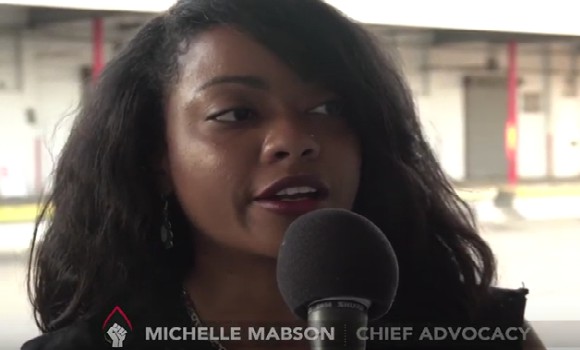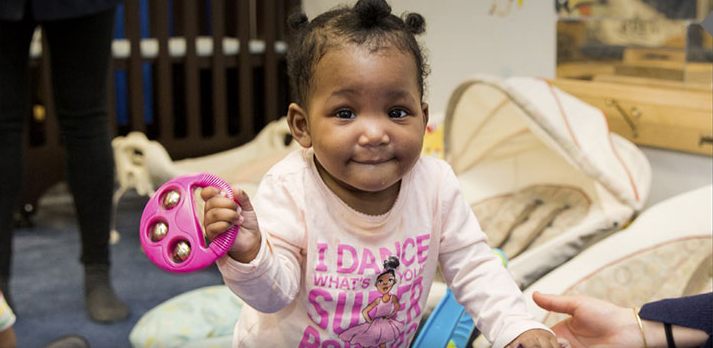[Eric Garner, Earth Day and the EPA at 50]
Mabson: “To commemorate the bond between Earth Day now 50 and Eric Garner’s life, do what communities did when he died. Communities across the country came together using “I can’t breathe” as the protest cry.”
Photo: YouTube
Health scientist Michelle Mabson explores connections between the racism that choked the breath of life from Eric Garner to the toxic air pollution and environment racism affecting African-Americans.
Eric Garner, Earth Day, and the U.S. Environmental Protection Agency (EPA) share common bonds. Each was born in 1970. Each are examples of how the power of pollution can destroy our environment, endanger public health, dirty our air, or kill African-Americans.
Each will mark 50 years this year, except Eric Garner.
When Eric Garner, face down in a chokehold, pleaded, “I can’t breathe,” eleven times to the police, they ignored him. But Black communities heard him. Almost five years after his death, the doctor who performed Garner’s autopsy testified that the police choked him with a force that triggered a “lethal cascade” of events resulting in a fatal asthma attack. Eric Garner suffered from chronic asthma, a disease which African-Americans are nearly three times as likely to die of than whites.
Earth Day now 50 necessitates a closer look at the air we breathe. The air may be cleaner than it was fifty years ago, but it’s still not clean enough in all communities. In too many African-American, Latinx and Indigenous communities, the air breathed is polluted. With COVID-19, the world is finally seeing what our communities have been saying forever: the combination of deep-rooted environmental injustices, bad public health policies, and pollution are deadly to Black lives. According to preliminary tracking data compiled by some cities, Blacks in the U.S. are dying from COVID-19 at disproportionately higher rates than other populations.
People who contracted COVID-19 and live in areas with high levels of air pollution before the pandemic are more likely to die from the virus than those living in less polluted areas. A study points out that this could be connected to long-term exposure to air pollution based on living near polluting coal plants, refineries, and other places emitting fine particulate matter – the tiny pollution particles linked to lung disease, heart disease, and premature death. Blacks are exposed to 1.54 times more of this form of pollution than the population at large. There is little to celebrate.
In fact, one rural town in the center of “Cancer Alley” has the highest per capita COVID-19 death rate in the country. Residents of St. John the Baptist, a majority Black parish just 30 miles from New Orleans, LA, have been calling for the shutdown of a massive petrochemical facility that has been polluting the air at unsafe levels for decades. Local activists are sounding the alarm and link the high COVID-19 related deaths to autoimmune diseases and respiratory ailments associated with exposure to the pollution.
Under the Trump administration and EPA Administrator Andrew Wheeler, a former coal lobbyist, climate change is denied, science and evidence-based facts are ignored, and polluters can pollute. While medical professionals focus on treating COVID-19 patients and the sick fight for their lives, the administration is focused on dismantling clean air protections and weakening pollution standards desperately needed to protect health during and after this pandemic.
In the midst of the pandemic, the Trump administration announced a polluters’ wish list of rollbacks that will increase air pollution and harm public health. EPA suspended policy enforcement actions – allowing big corporations to pollute at will. Standards for cars and trucks have been weakened despite EPA indications that doing so would increase premature deaths from air pollution. Protections from mercury, soot, and arsenic pollution from power plants have also been undermined. Wheeler ignored advice from his EPA staff and outside scientists and decided not to change the current federal air quality standards, which inadequately protects public health from fine particle pollution from burning fossil fuels. Wheeler doesn’t listen to community voices; EPA has fewer and shorter periods for communities to comment on environmental policies. And the Trump administration is attacking the National Environmental Policy Act, which would take away our communities’ power to give input when federal projects threaten our environment and health.
I’m an activist scientist. Science matters. It is the key to help improve health, find cures for diseases, and save lives. As a scientist, I believe in facts over fiction and research over rumors. I also believe in putting my scientific knowledge and environmental activism to work addressing environmental injustices, fighting for clean water in Flint, highlighting social determinants rooted in American racism, and advocating for just environmental policies.
These are challenging times.
To move forward, we need to join the Congressional Black Caucus and others in demanding that the Trump administration require federal agencies to track and report race-specific data around COVID-19. Race-specific data collected is crucial to provide transparency and understanding of the coronavirus pandemic’s impact on African-Americans. The data can be used to address underlying health disparities and develop solutions.
To commemorate the bond between Earth Day now 50 and Eric Garner’s life, do what communities did when he died. Communities across the country came together using “I can’t breathe” as the protest cry against police brutality. With social distancing, we can come together through social media. We can use “I can’t breathe” as the protest cry for environmental brutality.
We can use our voices, our fight, and our resilience to reduce pollution, increase environmental justice, and live healthier futures.
Michelle Mabson is a social justice activist and health scientist based in Washington, D.C. A dedicated and mission-driven leader, Michelle joined the Earthjustice Healthy Communities team in 2017, shortly after leaving the U.S. Environmental Protection Agency where she saw firsthand how the administration change had the power to threaten essential health protections. As an activist, Michelle serves as the co-founder and chief advocacy officer for Black Millennials 4 Flint (BM4F) the Nation’s first and only grassroots environmental justice and civil rights organization fighting to eradicate lead across black and brown communities.








